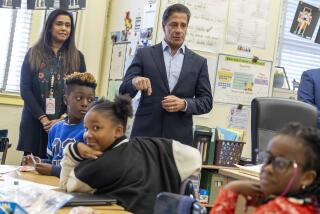Success Prep or Too Much Too Soon?
- Share via
Like homeroom, field trips and recess, homework is a ubiquitous part of elementary school. It’s important, some educators say, because it reinforces class lectures, teaches students to work independently and sharpens time-management skills. But other academics say too much saps students’ free time, causes friction with parents and does little to boost test scores. In 1997, 6- to 8-year-old pupils spent as much as two hours a day on homework, triple the amount in 1981, according to the Institute for Social Research at the University of Michigan.
KARIMA A. HAYNES spoke with parents of children in Los Angeles Unified School District elementary schools about homework.
SHARLENE SALEH / 35; Bookkeeper, Northridge
My daughter Farah is in the third grade at Beckford Avenue Elementary School [in Northridge]. She gets a lot of homework. She gets vocabulary every night and assignments from at least two other subjects, like math, science or social studies. On top of that, they have a Weekly Reader magazine, where they have to read a story and answer the questions. She starts her homework right after school and works on it for at least two hours; sometimes it can be longer.
I like that she gets a lot of homework. I don’t think kids get enough homework. That’s why they get into trouble, because they have free time on their hands. Kids will come home, get something to eat and watch TV if they don’t have something to do.
DARLENE LLORENS / 44; registered nurse, Mission Hills
My son Paul was feeling stressed out because they were giving him a lot of homework. On Monday nights he would have language arts, spelling words and would have to write in a journal. It didn’t seem overwhelming at first, but if there was work that wasn’t completed in class or long-term projects, it just got to be too much.
I think there should be a certain amount of homework depending on [a student’s] grade level, but there has to be a consideration that times have changed. Moms aren’t home when the kids get out of school.
We had to cut out track and other sports activities [because] there was no time to get homework done and get in bed by 8:00 or 8:30. The only thing he was able to do after school was begin his homework, take a break for dinner, then do more homework and then straight to bed.
Balboa [Boulevard Elementary in Northridge] is a high-achieving, gifted magnet school. There was the expectation not only to do second-grade-level work but to go beyond. Some kids can rise to that challenge, but Paul was only able to keep up with second-grade-level work.
Paul began to lose self-esteem. Whereas in the neighborhood school [Danuabe Avenue Elementary in Granada Hills], he was at the top of his class, at Balboa, he wasn’t even close to the top. One day he just broke down and wept. He kept telling me he was nothing. I said, “You can excel to be the president of the United States, and he said, ‘I wouldn’t do that to the people. I’m just not smart enough.”’
[My husband and I] asked ourselves, “Is it worth it for him to be turned off by education at such an early age for the status of saying he is at a high-achieving magnet?” It wasn’t worth it for us. The goal is for him to get an education and do well in life, but not at the expense of losing his self-esteem. We decided to send him back to Danube.
People think that parents don’t want to put in the time, but we put in the time. Homework should reinforce what children learn in the classroom that day, but it shouldn’t take all night.
JANICE SHEEAN / 40; homemaker, Granada Hills
I have twin daughters who are in the second grade at Haskell Avenue Elementary School [in Granada Hills], but they have different teachers, so the work is never the same. I am not bothered by the amount of work because I want the kids to excel.
We work on homework for at least 1 1/2 hours--and that’s per child. I start with my daughter Krystal who is 7. She reads to me and then I have her explain the story from beginning to end. Then she starts her other homework. Then I start with Jennifer; she reads to me and then she does her work. We alternate who reads first every night.
I think children need a heavier load. . . . You can’t think your child is going to get it all in the classroom; you have to work with the teacher. I want my children to succeed, and homework is the ticket.
More to Read
Sign up for Essential California
The most important California stories and recommendations in your inbox every morning.
You may occasionally receive promotional content from the Los Angeles Times.













